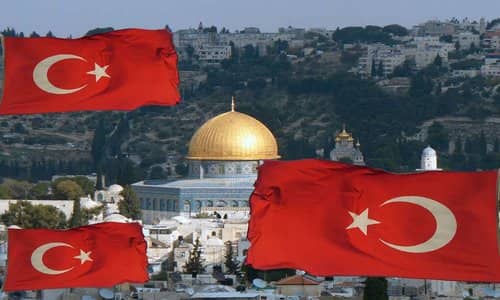Turkey: Erdogan's Obsession To Take Jerusalem
 By Burak Bekdil/Gatestone Institute July 20, 2017
Share this article:
By Burak Bekdil/Gatestone Institute July 20, 2017
Share this article:
Less than a year ago, Turkey and Israel agreed to end their
six-year-long diplomatic stand-off and officially "normalized" their
relations.
They appointed ambassadors Kemal
Okem to Israel and Eitan Na'eh to Turkey, two prominent career
diplomats, who, since then, have been struggling actually to normalize
formally normalized ties. As some observers, including your humble
correspondent, cautioned in 2016:
"Erdogan had
pragmatically agreed to shake hands with Israel, but his ideological
hostility to the Jewish state and his ideological love affair with Hamas
have not disappeared; so the Turkish-Israeli 'peace' would not be easy
to sustain".
Only half a year into the
"normalized charter" Erdogan in May pledged that his government would
work with the Palestinian people to guard against the "Judiazation of
Jerusalem."
This may be vintage Erdogan. The
Turkish president's promise was not too different from a call for a
struggle to guard against the "Catholicization of the Vatican."
It
is elementary history that Jerusalem's pre-Islamic period of 3300-1000
BCE appeared in the book of Genesis -- the time of Abraham, Isaac and
Jacob -- when Erdogan's ancestors were probably hunters in the steppes
of Central Asia.
The years 1000-732 BCE marked the period of the ancient
kingdoms of Israel and Judah. Simply put, Jerusalem's Judaic history
dates back to thousands of years before the birth of Islam.
Nevertheless, according to Erdogan, there is a necessity "to protect-against the Judaization of Jerusalem."
Erdogan,
in his May speech, also repeated an earlier call for Muslims from
around the world to "visit al-Aqsa" mosque, located on the Temple Mount
in Jerusalem. "As a Muslim community, we need to visit al-Aqsa Mosque
often," he said. "Each day that Jerusalem is under occupation is an
insult to us."
In 2016, a total of 26,000 Turks
visited al-Aqsa Mosque (out of a population of 80 million). Erdogan
also said he wants "hundreds of thousands of Muslims" at the Muslim holy
site in his campaign to "flood Jerusalem [with Muslims] and drive out
the occupiers".
During the reconciliation with
Israel, Ankara pledged to end its support for Hamas; Turkey even
expelled Saleh al-Arouri, the most senior Hamas official then residing
in the country. But ultimately, there were reports that Erdogan was not
really willing to live up to his end of the bargain. The journalist Yoav
Zitun wrote in Ynet News:
Hamas' presence in
Turkey continues despite the departure of Saleh al-Arouri, who headed
Hamas in Turkey before leaving the country following Israeli demands
during the reconciliation negotiations.
His successors are recruiting Palestinian students to study in Muslim countries in general and Turkey in particular.
The students are then sent for military training in
Lebanon or Syria, and from there, return to the West Bank to carry out
attacks against Israel.
Zitun details some intriguing cases:
For
example, two months ago, the IDF and Shin Bet detained, a Palestinian
who had been living in Turkish Cyprus for several years. In August 2015,
Qazmar was recruited in Jordan by Hamas, given military training and
explosives expertise. During a meeting with Hamas operatives in Istanbul
last January, he was instructed to recruit terrorists in the West Bank
using encrypted memory cards.
Another highly
publicized case concerns Muhammad Murtaja, who has head of a
humanitarian aid organization of the Turkish government in Gaza.
According to the Shin Bet following his arrest, Murtaja was accused of
transferring millions of dollars to Hamas operatives that was donated by
Ankara.
Turkish money flowing into the hands
of men who are committed to the annihilation of Israel is part of
ideology, not humanitarian aid.
Trying to brand itself as the international savior of the
Islamist cause, Turkey has, since 2004, invested millions of dollars
into 63 different projects designed to "defend and strengthen the Muslim
heritage and character of Jerusalem."
The money is often channeled through a government agency, the Turkish Cooperation and Development Agency (TIKA).
In
these efforts to "defend and strengthen Jerusalem's Muslim heritage and
character" Turkey also partnered with Sheikh Raed Salah, leader of the
Northern Branch of the Islamic Movement in Israel, and with Sheikh Akram
Sabri, a former mufti of Jerusalem. Both men oppose to Israel's right
to exist.
As an American friend delicately asked: "Isn't Turkey supposed to be investing millions to help rebuild Gaza?"
Not, it seems, when Islamist ideology is involved.
Originally published at the Gatestone Institute - reposted with permission.

No comments:
Post a Comment